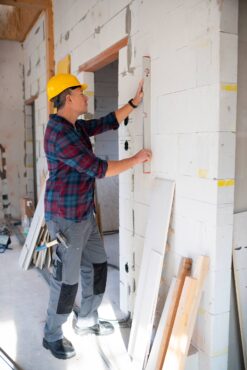 As a professional, certified builder specializing in residential remodel, I am engaged by hundreds of potential clients each year. Because of such huge demand and a shortage of qualified remodelers, contractors must be very tactical about what jobs they pursue. There’s just not enough time in the day to meet everyone’s needs. Here are some suggestions to help improve your chances of getting an engagement from a remodel contractor.
As a professional, certified builder specializing in residential remodel, I am engaged by hundreds of potential clients each year. Because of such huge demand and a shortage of qualified remodelers, contractors must be very tactical about what jobs they pursue. There’s just not enough time in the day to meet everyone’s needs. Here are some suggestions to help improve your chances of getting an engagement from a remodel contractor.
When you’re discussing a project with contractors, these are some of the questions they may ask you upfront:
- What is the project?
- Where is the project?
- Have you worked with contractors before? How did it go?
- Are you working with other contractors or designers?
- Is there a defined, realistic budget?
- When would you like this project completed?
Why are these questions important to contractors? They need to ensure that you’re looking for a great remodeler, and a great remodeler is looking for a great client who is a good fit for the company. These questions help contractors assess whether they’re a good fit for you and the project.
Contractors also want to know if your project is one that their team can perform well on. For instance, a company might specialize and have systems in place that make it very good at one type of project. It may focus time and energy to train its employees and build relationships with the best suppliers and subcontractors for that type of work. And this builder may not want to take on other types of work that the company doesn’t perform well, knowing that it’s not competitive in that area. Additionally, it may not have the design or technical knowledge to price and perform the required work.
Most reputable contractors are very busy and will not need to travel far to find an ample amount of work that fits their desired type of job. That travel time savings make the employees more productive because they’ll be able to use their typical supply houses and subs instead of having to develop out-of-area relationships that may result in unknown and costly interactions.
Why would a contractor want to know if you have worked with other contractors in the past? It helps to understand past experiences. For example, was there an issue such as the project taking too long? Did it go over budget? This information enables the contractor to understand expectations and address concerns before engaging in a long-term relationship to develop, estimate and perform the work on your project.
 Have other contractors or designers already been engaged with you on your project? If so, the next question may be who they are. If they’re reputable companies, the contractor may very well give them a referral. Another reason for this question is that most good contractors need to manage their time, and it takes a lot of time to produce a quality proposal and bid for a client. If there are several others bidding on your project, there may not be a lot of incentive to invest that time because the likelihood of a potential job is low.
Have other contractors or designers already been engaged with you on your project? If so, the next question may be who they are. If they’re reputable companies, the contractor may very well give them a referral. Another reason for this question is that most good contractors need to manage their time, and it takes a lot of time to produce a quality proposal and bid for a client. If there are several others bidding on your project, there may not be a lot of incentive to invest that time because the likelihood of a potential job is low.
The question about timing is very important because the contractor may not want to look at a project that’s two years away. At that point, the project will need a rebid and the contractor would rather focus on the current workload of estimates and work. The other side of this timeline is that most reputable contractors have a backlog of work and may not respond to jobs with very tight turnarounds.
The hardest question for contractors to ask — and for most people to answer — is about the budget expectations. For many homeowners, it’s a very personal subject and it may feel offensive to get that question upfront. Too many times, the designer, engineer and potential client have no idea of the cost, and a contractor wants to know that the client has a realistic expectation.
When we ask about budget, many people say that either they don’t have any idea or that this is the reason they’re calling us. But this is a very important question. If you indicate your top budget is $15,000 for a kitchen remodel and the contractors know it’s going to cost $60,000-$70,000, that conversation is better to have before they spend many hours putting together plans and estimates. Planning and estimating is a cost to their business, and they need to ensure that a realistic budget is in place before they make that investment in your project. Knowing the budget also helps the contractor make suggestions for how to complete a project within that budget.
 How to Get That Contractor Interested
How to Get That Contractor Interested
How do you address the questions that the contractor asks to determine interest in your job? Here are some suggestions.
Ask for referrals from others who have completed similar projects. (But keep in mind that just because a friend or relative did work for them such as installing a roof or painting the house doesn’t mean that contractor is great at kitchens). A better choice would be to call the local building association or check at a supply house. Those referrals will be for contractors who are in good standing.
Engage contractors who are close and service your area. A contractor located 40 miles away is going to be less excited than one working regularly in your community.
If you had a good experience with a company, be upfront and let them know how positive the experience was. That contractor will be excited to work for you again or give you a great referral if it’s for work outside of their specialty.
Rather than asking multiple contractors for bids and choosing the lowest bid, interview a contractor as a partner who can get your project developed and completed in a mutually beneficial manner. It’s impossible to get an apple-to-apple bid because each contractor brings different value to your project. Remember, you and your contractor will be spending a lot of time in this mutual relationship. Trust and relationship outweigh cost or profit. Contractors will always prioritize a repeat client or a client who is referred by a great past client. And these repeat or referred homeowners have likely already seen the contractor’s work and understand the quality and process.
Above all, be very open and honest with what you are trying to get accomplished and why. Understand the contractor’s needs as well as your own. Viewing the project as a collaborative effort and a partnership to achieve a mutually beneficial result will always be attractive to great contractors, and they will be more willing to engage in your project.



























